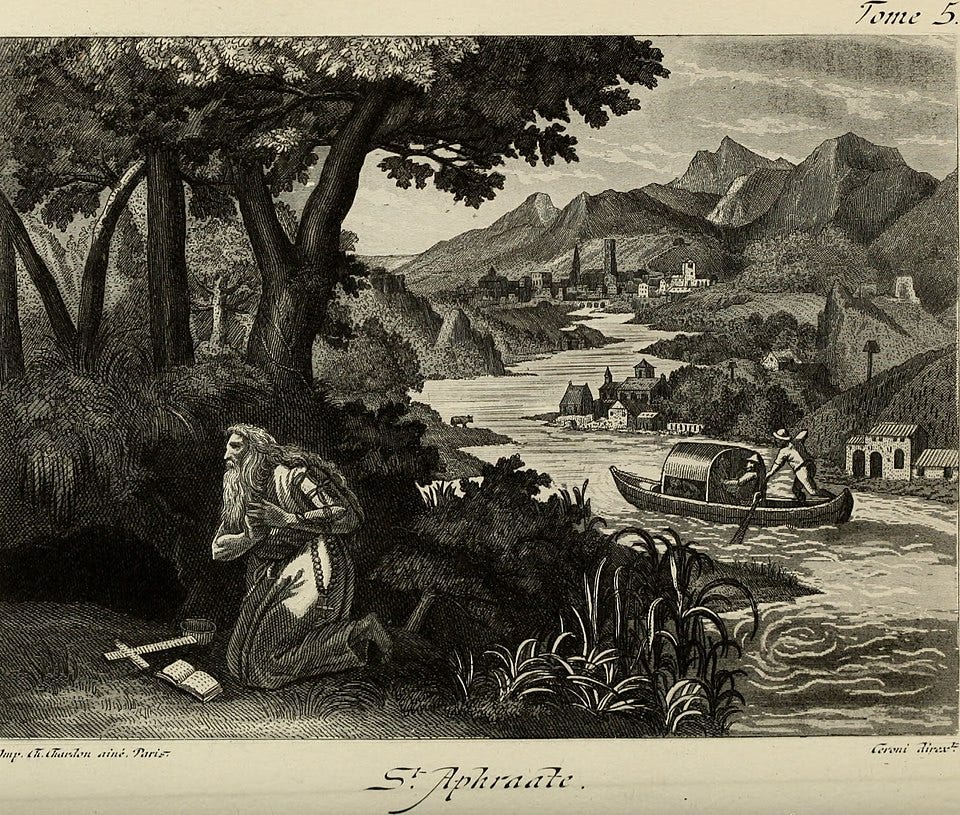
About the text: St. Aphrahat (c. 280–c. 345) lived in the Sasanian Empire, in what is today Iran. He lived most of his life as a monk and later in life wrote a series of Demonstrations. Here we present an excerpt from his twenty-second demonstration, wherein he reflects on the futility of wisdom and prestige in this life, and on what it will be like for the just in the world to come.
—
10. Remember, my beloved, and compare and consider in thy mind, who is there of former generations who has been left in this world so as to continue for ever? Death has led away the former generations, the great ones and the mighty and the subtle. Who is there that acquired great possessions, and at the time when he departed took them with him? That which was gathered together from the earth returns back into its bosom; and naked does a man depart from his possessions. The wise, when they acquire goods, send some of them before them, as Job said: “My witnesses are heaven,” and again: “My brethren and my lovers are with God” (Job 16:19-20). And our Lord commanded them that acquire possessions to “make for themselves friends” in heaven, and also to “lay up treasures” there (Mt 6:20; Lk 16:9).
11. Do thou also remember death, O wise scribe, that thy heart be not lifted up, so that thou shouldest forget the sentence of judgment. Death leaves not aside the wise, nor respects the persons of the subtle. Death leads away to himself the wise scribes, so that they forget that which they have learned, until the time comes in which all the righteous shall rise again.
12. In that place they shall forget this world. There they have no want; and they shall love one another with an abundant love. In their bodies there shall be no heaviness, and lightly shall they fly “as doves to their windows” (Is 60:8). In their thoughts they shall not there remember wickedness at all, nor shall anything of uncleanness arise in their heart. In that place there shall be no natural desire, for there they shall be weaned from all appetites. There shall not arise in their heart anger or lasciviousness; also they shall remove from them all things that gender sins. Fervent in their heart will be the love of each other; and hatred will not be fixed within them at all. They shall have no need there to build houses, for they shall abide in light, in the mansions of the saints. They shall have no need of woven raiment, for they shall be clothed in eternal light. They shall have no need of food, for they shall recline at His table and be nurtured for ever. The air of that region is pleasant and glorious, and its light shines out, and is goodly and gladsome. Planted there are beautiful trees, whose fruits fail not, and whose leaves fall not. Their boughs are glorious, their perfume delightful, and of their taste no soul shall grow weary for ever. Spacious is the region, nor is it limited; yet its inhabitants shall see its distance even as that which is near. There the inheritance shall not be divided, and no man shall say to his fellow: “This is mine and that is thine.” They shall not be bound there in the desire of covetousness, nor shall they go astray there concerning remembrance. There a man shall not love his neighbour with especial reverence, but abundantly shall they all love one another after one fashion. They shall not marry wives there, nor shall they beget children; nor shall there the male be distinguished from the female; but all shall be sons of their Father Who is in heaven; as the Prophet said: “Is there not one Father of us all; is there not one God Who created us” (Mal 2:10)?
13. And as regards that which I said; that there they shall not take wives, nor is male distinguished from female, our Lord and His Apostles have taught us. For our Lord said: “They that are worthy of that world, and of that resurrection from the abode of the dead, shall not take wives, nor shall women become wives to men; for they cannot die; but they are as the angels in heaven, and are the children of God” (Lk 20:35-36). And the apostle said: “There is neither male nor female, neither bond nor free; but ye are all one in Jesus Christ” (Gal 3:28). For, as for Eve, to spread abroad generation, God took her out from Adam, that she might become the mother of all living; but yet in that world there is no female; even as in heaven also there is no female, nor generation, nor use of concupiscence. In that place there is no deficiency, but fullness and perfection. The aged shall not die and the young shall not grow old. And it is in expectation of growing old and dying that young men take wives and beget children, that when the fathers shall have died the children may rise up in their stead. Now all these things have their use only in this world, for in that place there is no want, nor any deficiency, nor concupiscence, nor generation, nor ending, nor failure, nor death, nor termination, nor old age. There is neither hatred, nor wrath, nor envy, nor weariness, nor toil, nor darkness, nor night, nor falsehood. There is not in that place any want at all; but it is full of light, and life, and grace, and fullness, and satisfaction and renewal, and love, and all the good promises that are written but not yet sealed. For there is there that “which eye hath not seen and ear hath not heard, and which hath not come up into the heart of man” (1 Cor 2:9), that which is unspeakable and which a man cannot utter. And the Apostle said: “That which God hath prepared for them that love Him” (1 Cor 2:9). Though men shall say much, they shall not be able to express it. That which eye hath not seen, they are unable to relate; and that which ear hath not heard, it is not right to speak of in such wise as to compare it with anything that the ear has heard and the eye has seen. And that which has not come up unto the heart, who is there that dares to speak of it, as though it was like anything that has come up into the heart? But this is right for a speaker, to liken and call that place the abode of God, and the place of life, the perfect place, the place of light, the place of glory, the Sabbath of God, the day of rest, the repose of the righteous, the joy of the just, the abode and dwelling-place of the righteous and the holy, the place of our hope, the sure abode of our trust, the place of our treasure, the place that shall assuage our weariness and remove our afflictions, and soothe our sighs. To these things it is right for us to liken, and thus to call, that place.
—
From Nicene and Post-Nicene Fathers, series2, vol. 13, trans. John Gwynn (Edinburgh: T & T Clark): 405-7.

Leave a Reply